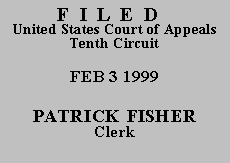

| JAMES ALVIN MOORE, III,
v.
RON WARD |
|
Before BRORBY, EBEL, and
LUCERO, Circuit Judges.
After examining the briefs and appellate record, this panel has determined
unanimously that oral argument would not materially assist the determination of
this appeal. See Fed. R. App. P. 34(a)(2); 10th Cir. R. 34.1(G). The case is
therefore ordered submitted without oral argument.
James Alvin Moore, a pro se state inmate, appeals the district court's dismissal of his habeas petition, filed pursuant to 28 U.S.C. § 2254, as untimely under the Anti-Terrorism and Effective Death Penalty Act of 1996. Because the district court failed to apply the tolling provision in 28 U.S.C. § 2244(d)(2) and a question exists as to Mr. Moore's timely filing for state post-conviction relief, we grant Mr. Moore's request for a certificate of appealability under 28 U.S.C. §§ 2253(c)(1)(A) & (c)(2), and remand Mr. Moore's § 2254 petition to the district court for a determination on its timeliness.
On May 18, 1984, the State of Oklahoma convicted Mr. Moore of one count each of escape from a penitentiary; kidnaping; assault and battery with a dangerous weapon; and robbery with a firearm after former conviction of a felony. On direct appeal granted out-of-time, the Oklahoma Court of Criminal Appeals vacated and remanded his convictions for kidnaping and assault with a dangerous weapon. The state trial court dismissed those charges and resentenced Mr. Moore to seventy-seven years in prison. Mr. Moore failed to file any post-conviction appeal until April 10, 1997, when he allegedly delivered an application for an appeal out of time on his resentencing to state prison authorities, which the Oklahoma state trial court later file-stamped on April 24, 1997. The state trial court denied his application on June 17, 1997, and on November 4, 1997, the Oklahoma Court of Criminal appeals affirmed its decision. On November 13, 1997, Mr. Moore allegedly delivered his § 2254 petition to prison officials for mailing, even though the federal district court clerk did not file-stamp it until December 3, 1997.
The federal district court referred Mr. Moore's § 2254 petition to a magistrate judge who issued a report and recommendation. Because Mr. Moore's conviction occurred prior to enactment of the Anti-Terrorism and Effective Death Penalty Act of 1996, the magistrate judge determined the limitation period for filing his petition extended to April 23, 1997. Relying on decisions of other district court judges, the magistrate judge found the tolling provisions under 28 U.S.C. § 2244(d)(2) for the period Mr. Moore sought state post-conviction relief did not apply to the limitation period, making Mr. Moore's petition untimely. Alternatively, the magistrate judge determined that even if the tolling provision did apply, no tolling occurred because Mr. Moore filed his state application for post-conviction relief on April 24, 1997 one day after the limitation expired. The magistrate judge also considered and rejected Mr. Moore's claim that he never timely filed a direct appeal because he believed his counsel planned to file the appeal. Lastly, the magistrate judge found Mr. Moore failed to present any basis for an "equitable tolling of the limitation period." Thus, the magistrate judge recommended the petition be dismissed as untimely.
Mr. Moore filed a timely objection to the Report and Recommendation asserting he timely filed his state application for relief by giving it to proper prison officials for mailing on April 10, 1997, even though the state court file-stamped it on April 24, 1997. After reviewing the record and Mr. Moore's objections de novo, the district court dismissed his § 2254 petition as untimely, determining the tolling provisions under 28 U.S.C. § 2244(d)(2) do not apply to the limitation period ending April 23, 1997. Thus, even if Mr. Moore submitted his application to prison authorities for mailing on April 10, 1997 as claimed, the district court concluded such a filing could not toll the limitation period ending April 23, 1997.
On appeal, Mr. Moore asserts he is entitled to application of the tolling provision of § 2244(d)(2) based on this court's recent decision in Hoggro v. Boone, 150 F.3d 1223 (10th Cir. 1998). In applying the tolling provision, Mr. Moore claims his petition is timely because he initiated his state application on April 10, 1997, thus tolling the limitation period on that date rather than on April 24, 1997.
In response, the State of Oklahoma acknowledges the § 2244 tolling provisions apply and requests we remand this case to the district court for further proceedings in light of our recent decision in Hoggro. On remand, the State asserts new information obtained from the postal supervisor for the Oklahoma State Penitentiary will show Mr. Moore's petition is untimely.
As both parties contend, our recent decision in Hoggro establishes federal courts, pursuant to 28 U.S.C. § 2244(d)(2), must toll the one-year filing limitation period by the time spent in state court post-conviction litigation. Hoggro, 150 F.3d at 1226. However, in this case, it is unclear whether Mr. Moore timely filed his application for state post-conviction relief prior to April 23, 1997. Because the district court failed to apply the tolling provision in 28 U.S.C. § 2244(d)(2) and a question exists as to the timely filing of Mr. Moore's state post-conviction application, we grant Mr. Moore's request for a certificate of appealability under 28 U.S.C. §§ 2254(c)(a)(A) & (c)(2) and REMAND to the district court for a determination on the timeliness of his § 2254 petition.
Entered by the Court:
WADE BRORBY
United States Circuit Judge
*. This order and judgment is not binding precedent except under the doctrines of law of the case, res judicata and collateral estoppel. The court generally disfavors the citation of orders and judgments; nevertheless, an order and judgment may be cited under the terms and conditions of 10th Cir. R. 36.3.